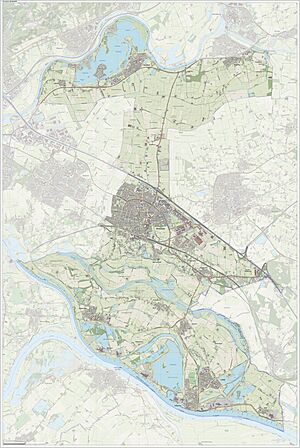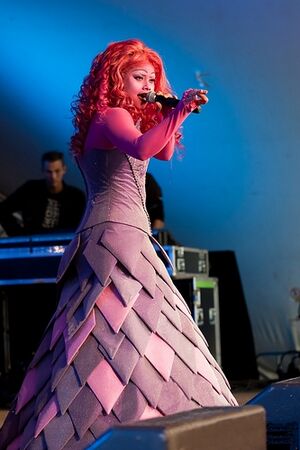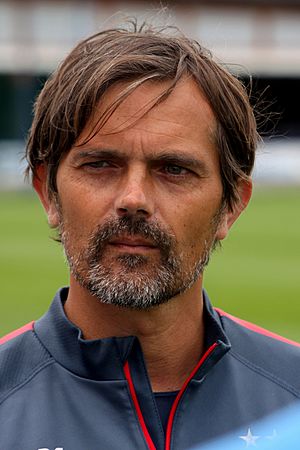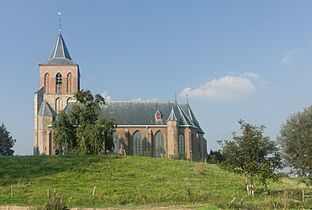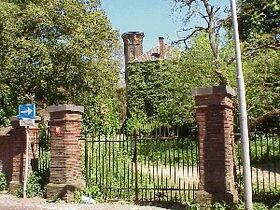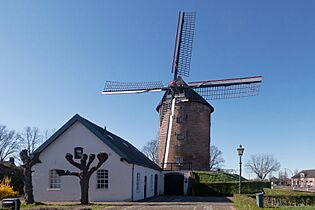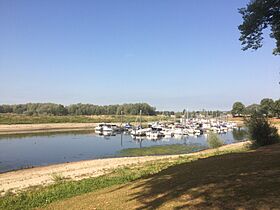Zevenaar facts for kids
Quick facts for kids
Zevenaar
|
|||
|---|---|---|---|
|
City and municipality
|
|||
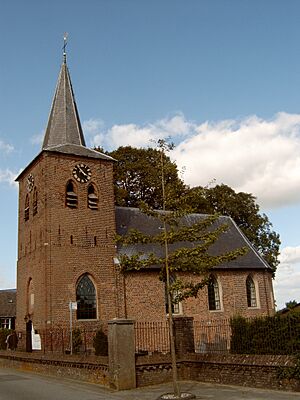
Church in Lathum
|
|||
|
|||

Location in Gelderland
|
|||
| Country | Netherlands | ||
| Province | Gelderland | ||
| Government | |||
| • Body | Municipal council | ||
| Area | |||
| • Total | 58.00 km2 (22.39 sq mi) | ||
| • Land | 53.26 km2 (20.56 sq mi) | ||
| • Water | 4.74 km2 (1.83 sq mi) | ||
| Elevation | 12 m (39 ft) | ||
| Population
(May 2014)
|
|||
| • Total | 32,282 | ||
| • Density | 606/km2 (1,570/sq mi) | ||
| Demonym(s) | Zevenaarder | ||
| Time zone | UTC+1 (CET) | ||
| • Summer (DST) | UTC+2 (CEST) | ||
| Postcode |
6900–6909, 6986–6988
|
||
| Area code | 0313, 0316 | ||
Zevenaar is a city and a municipality in the eastern Netherlands. It is located in the Gelderland province, very close to the border with Germany.
In January 2018, the nearby municipality of Rijnwaarden became part of Zevenaar. This made Zevenaar a larger municipality.
Contents
Towns and Villages in Zevenaar
The municipality of Zevenaar includes several smaller towns and villages. These are:
- Angerlo
- Babberich
- Giesbeek
- Lathum
- Ooy
- Oud-Zevenaar
- Zevenaar
History of Zevenaar
Early Beginnings
People have lived in the area of Zevenaar for a very long time. The oldest signs of human life are from a settlement built around 700 BC. In 1049, a powerful ruler named Emperor Hendrik III gave a lot of land to five important leaders. One of these leaders was Bartholomeus II of Sevenaer. They built a castle to protect the old Roman settlements from attacks.
Changes in Control
In 1355, Sevenaer (as it was then called) changed hands. It went from being part of the Guelders region to the Duchy of Cleves. The modern Dutch province of Gelderland is named after the old Guelders region.
In 1487, the Duke of Cleves gave Sevenaer special "city rights." This was a big deal! Zevenaar was an important place because it was on the border between different powerful regions. These regions would later become the countries we know today as the Netherlands and Germany. Some old castles and houses in Zevenaar, like Huize Sevenaer, still have parts built in the 14th century.
Life in the City
When Sevenaer got city rights, it also gained special powers. It was the only place in the area allowed to hold markets and sell bread and beer. The town government also started collecting taxes. These taxes helped pay for roads and public buildings. For the 500 people living there at the time, these taxes were quite high.
However, armies often plundered the town, meaning they stole supplies and money. This made it hard to build new things. Despite this, some wealthy families helped the town grow. Zevenaar then had a good period of growth and success.
Becoming Part of Larger Powers
In 1614, Zevenaar became part of the Margraviate of Brandenburg. This area would later become part of Prussia, a very strong European country. By 1793, the city had grown to about 900 people.
In 1816, Zevenaar joined the Kingdom of the Netherlands. Two years later, its name changed from Sevenaer to the current spelling, Zevenaar. The municipality then had 2,564 people. The 1800s were a tough time, with poverty, bad harvests, and sickness. Many people worked in farming or relied on charity.
Modern Growth
Things started to improve in 1856 when Zevenaar got connected to the European railroad system. This made it easier for people to travel and for businesses to grow. It also led to more jobs.
In 1920, a cigarette factory called Turmac opened in Zevenaar, creating even more jobs. After World War II, which caused a lot of damage, people worked hard to rebuild the city. New neighborhoods were built around the old town center. In the 1950s, about 10,000 people lived in Zevenaar. By 2005, this number had more than doubled to 22,500 residents.
Famous People from Zevenaar
Many interesting people have come from Zevenaar and the surrounding areas.
- Andreas Masius (1514–1573) – A Catholic priest and a very smart scholar.
- H. L. M. van Nispen van Sevenaer (1879–1958) – A politician and a resistance fighter during the war.
- Karel de Nerée tot Babberich (1880–1909) – A talented symbolist artist.
- Thijs van Leer (born 1948) – A Dutch musician, famous for being in the band Focus.
- Linda Wagenmakers (born 1975) – A singer and voice actress.
- Esmée Denters (born 1988) – A female singer.
Sports Stars
- Minie Brinkhoff (born 1952) – A retired Dutch cyclist.
- Erik Parlevliet (1964–2007) – A field hockey player who won a bronze medal at the 1988 Summer Olympics.
- Phillip Cocu (born 1970) – A professional football manager and a famous former player.
- Servais Knaven (born 1971) – A Dutch professional road bicycle racer who competed in the Olympics.
- Danny Heister (born 1971) – A professional table tennis player.
- Wesley Koolhof (born 1989) – A professional tennis player.
Images for kids
See also
 In Spanish: Zevenaar para niños
In Spanish: Zevenaar para niños



